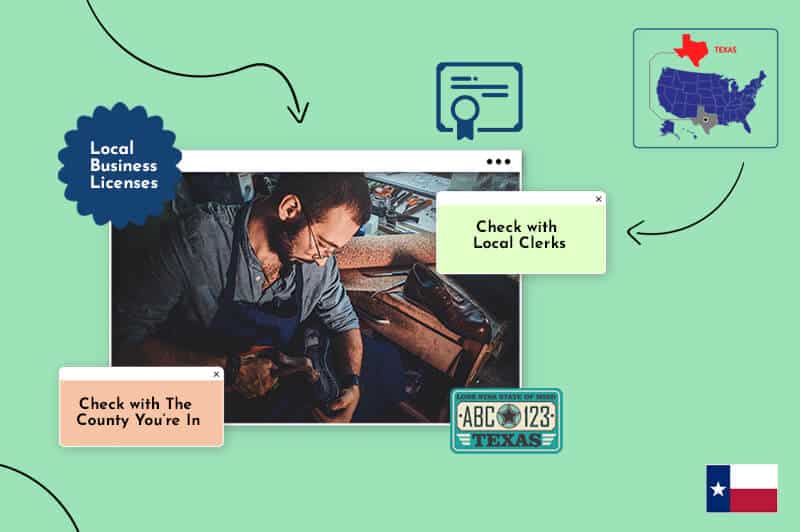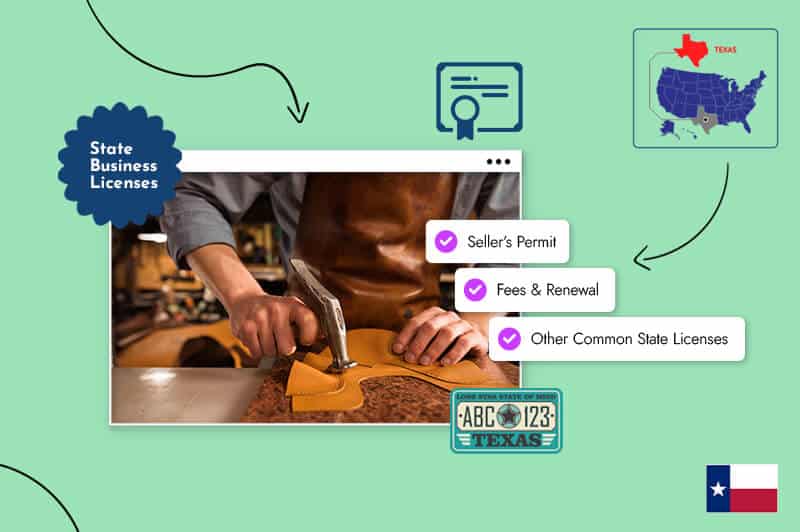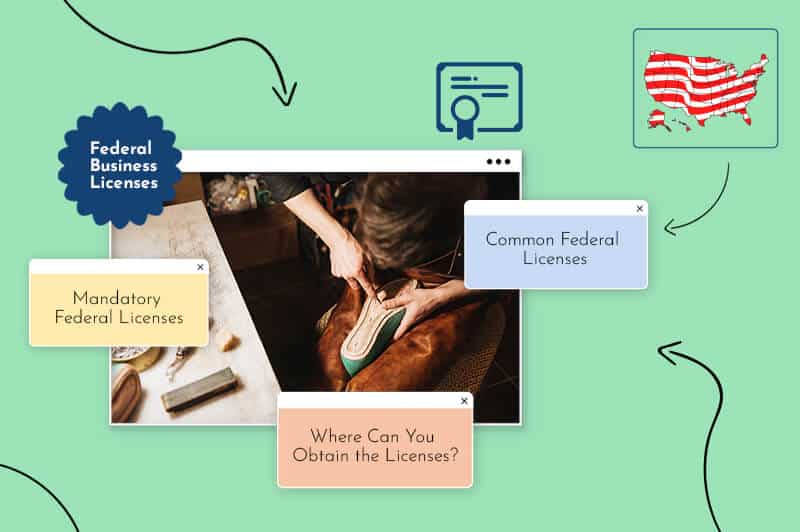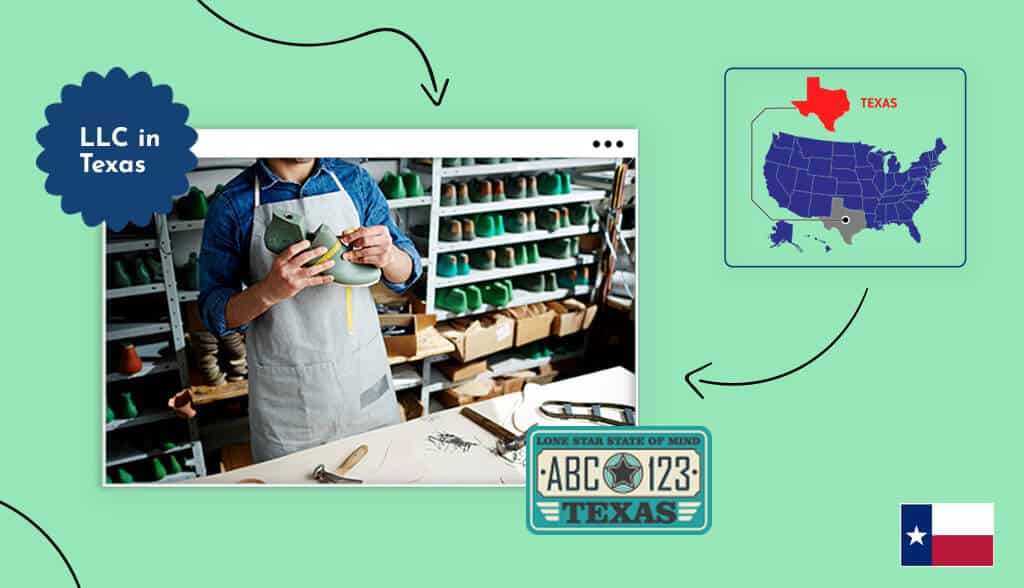If you’re exploring how to start a business in Texas, you’ll need to know that all types of businesses require various licenses and permits to operate. Some business licenses and permits are mandatory for all, while others depend on the type of business being run.
Knowing how to apply for a Texas business license or permit is an important consideration. No matter what type of business you operate be it an LLC in Texas or sole proprietorship, you’ll need to understand the processes, payments required and details of each license. If you’re just getting started, it’s also helpful to learn how to start an LLC in Texas so you establish the right foundation before applying for licenses.
What are business licenses and permits?
The state of Texas provides a helpful online guide to licenses, permits, authorizations, certifications and registrations necessary to run a business.
The comprehensive guide covers more than 300 types of businesses and details the procedures needed. The guide also links to other online resources necessary to complete the processes required to obtain licenses and permits.
Business licenses
The state of Texas does not require a general business license to operate within the state. However, businesses are required to register with the Texas Secretary of State or the local county clerk’s office.
By obtaining a certificate of formation from the Secretary of State’s office or an assumed name certificate from the county clerk’s office, a business will satisfy a requirement for a general business license that other states may mandate.
Despite the lack of a statewide mandate, many municipalities require a license or permit to operate within the city or county limits.
Permits
The state of Texas has a Business Permit Office as part of the Texas Economic Development division. The office’s goal is to make it easier to operate a business within the state.
The office helps businesses navigate the permitting, licensing and regulatory requirements within the state. The office itself does not issue any permits.
In addition to the permit guide, the office also has an ombudsman/liaison office to assist businesses with issues or delays they experience with the permit application or review process.
The office also offers a License and Permit tracker to assist businesses. The tracker is a grid that includes details for each license or permit, including:
- Issuing agency
- Contact information
- Date application was submitted
- Amount paid and how paid
- Date issuance expected
- Notes
- Date issued
- Renewal date, if needed
How to register for licenses/permits
To register as an LLC in the state of Texas, you’ll need to file a Form 205 – Certificate of Formation from the Secretary of State’s office. From there, requirements for local licenses and permits will vary based on the municipality where you will operate.
What happens if I fail to obtain a license?
Failure to obtain a license can be costly. Depending on the license, you may be subject to penalties at the local level. In some cases, a municipality may order you to stop operating until the necessary permits are obtained.
Local business licenses

In Texas, as in many states, there are local requirements to operate a business. These permits and licenses often relate to local health and occupancy guidelines. Fees are usually nominal; however, it’s important to obtain these approvals before operating.
Check with local clerks
If you are unsure where to start, a good practice is to contact the city or town clerk’s office. They can usually help you determine what is required and point you toward the appropriate office.
Check with the county you’re in
In addition to the city or town where you operate, you should also check with the county clerk to understand if there are specific guidelines. For example, in Harris County, where Houston is located, you must file a Property Tax Rendition with the county.
State business licenses

While there is no official Texas business license, you will still need to obtain a permit to sell within the state.
Seller’s permit
If you are going to conduct business in Texas, you must obtain a Texas sales and use tax permit. This requirement applies to any individual, partnership, corporation or legal entity doing business in Texas in any of the following situations:
- You sell tangible personal property in the state
- You lease or rent tangible personal property in the state
- You sell taxable services in the state
For remote sellers who are selling into Texas, or are a marketplace provider or seller in the state, you may need to obtain a sales and use tax permit. The state has a detailed website on the matter.
How to obtain a seller’s permit
You may obtain a sales and use tax permit for free from the state comptroller’s office using its eSystems portal. The application asks for the following information:
- Business organization type
- Legal name of corporation
- Federal Employer Identification Number (FEIN)
- A current or past Texas Taxpayer Number
- Whether you’ve ever received a Texas vendor or payee number and, if yes, to list it
- Home state or country where the entity was formed
- Formation date
- Home state registration or file number
- The file number provided by the Texas Secretary of State office if a non-Texas entity
- Name, home address, phone, Social Security number, FEIN, percentage of ownership and position held of each general partner, officer or managing member
- Entity mailing address
- Phone, fax and cellphone numbers
- Business website
- Contact person and address for business records
- Bank or other financial institution
- If accepting payments by credit cards using an online payment processing company, the name and assigned merchant identification number
- Place of business names and addresses (the physical addresses of any locations where sales personnel receive three or more orders for taxable items in a calendar year)
- Whether the place of business is your home
- If you ship to locations in Texas other than where you have your place of business
- Owner or landlord
- If there is a distribution center, warehouse, office or other location in Texas (if yes, must list all such locations’ addresses)
- If you have agents, representatives, salespeople, canvassers or solicitors working on your behalf in Texas (if yes, must list names and addresses)
- If you own, rent, use, sell or lease tangible personal property in Texas
- If you provide onsite taxable services at customer locations in Texas
- If you sell at temporary locations, such as trade shows, in Texas (if yes, the location or event name, and timeframe)
- Franchisee or licensee information
- Substantial ownership in or ownership by another business entity in Texas
- If you have internet sales or are a marketplace provider
- If your anticipated monthly sales exceed $8.000
- Whether you sell specific products, including alcohol, e-cigarettes, health spa memberships, fireworks or telecom services
- Your North American Industry Classification System code
Fees & renewal
There is no charge for this permit. The state will automatically renew it on your behalf.
Other common state licenses
There are no state licenses required to run your business. However, various state and county licenses may apply. You should check with each municipality where your business is located to learn about local licensing and permitting requirements.
Federal business licenses

Businesses in certain sectors will be required to obtain federal business licenses.
Are there mandatory federal licenses?
Depending on the type of business you operate, you may need to obtain federal licenses. These are important, mandatory licenses.
Common federal business licenses
You can obtain the necessary federal licenses from the appropriate federal agency. Here are some of the most common.
- Agriculture. The Animal and Plant Health Inspection Service of the U.S. Department of Agriculture issues permits for the import, release and transit of regulated animal and plant items
- Alcohol. The Alcohol and Tobacco Tax and Trade Bureau issues various permits online
- Aviation. The Federal Aviation Administration issues licenses and certificates for aircraft, operators (medical clearances), air carriers and airport
- Transportation. The .S. Department of Transportation issues permits for various transportation issues. Others, such as truck and cargo weight, are handled at the state level
Conclusion
Filing for licenses and permits in Texas takes some careful planning. While there is no statewide business license, you will need a sales and use tax permit to conduct business within the state. You will also need to check with local municipalities and the federal government for any required licenses and permits at those levels. Most of these requirements are specialized and depend on the type of business you operate.
